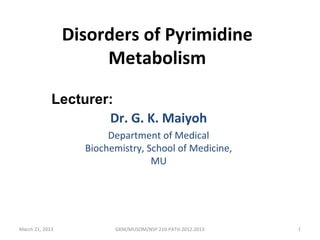
Disorders of pyrimidine metabolism
- 1. Disorders of Pyrimidine Metabolism Lecturer: Dr. G. K. Maiyoh Department of Medical Biochemistry, School of Medicine, MU March 21, 2013 GKM/MUSOM/NSP 210:PATH.2012.2013 1
- 2. Pyrimidines and Purines • Pyrimidine and purine are the names of the parent compounds of two types of nitrogen-containing heterocyclic aromatic compounds. N N N N N N H Pyrimidine Purine
- 3. Important Pyrimidines • Pyrimidines that occur in DNA are cytosine and thymine. Cytosine and uracil are the pyrimidines in RNA. O O NH2 CH3 HN HN HN O N O N O N H H H Uracil Thymine Cytosine
- 4. Synthesis Pathways • For both purines and pyrimidines there are two means of synthesis (often regulate one another) – de novo (from bits and parts) – salvage (recycle from pre-existing nucleotides) de novo Pathway Salvage Pathway
- 5. Many Steps Require an Activated Ribose Sugar (PRPP) 5’
- 6. de novo Synthesis • Committed step: This is the point of no return – Occurs early in the biosynthetic pathway – Often regulated by final product (feedback inhibition) X
- 7. Raw materials for biosynthesis O NH 2 • Synthesized C CH3 C H HN C N C from: – Glutamine O C C O C C N H N H – CO2 H H – Aspartic acid – Requires ATP Uracil Cytosine • Pyrimidine rings are synthesized independent of the ribose and transferred to the PRPP (ribose) • Generated as UMP (uridine 5’-monophosphate)
- 8. How is Pyrimidine Biosynthesis regulated? • Regulation occurs at first step in the pathway (committed step) • 2ATP + CO2 + Glutamine = carbamoyl phosphate X Inhibited by UTP If you have lots of UTP around this means you won’t make more that you don’t need. This is referred to as;
- 9. Biosynthesis: Purine vs Pyrimidine • Synthesized on PRPP • Synthesized then added to PRPP • Regulated by GTP/ATP • Regulated by UTP • Generates IMP • Generates UMP/CMP • Requires Energy • Requires Energy
- 10. Hereditary Orotic Aciduria • Is a defect in de novo synthesis of pyrimidines • Loss of functional UMP synthetase – Gene located on chromosome III • Characterized by excretion of orotic acid • Results in severe anemia and growth retardation • Extremely rare (15 cases worldwide) • Treated by feeding UMP
- 11. Why does UMP Cure Orotic Aciduria? Carbamoyl Phosphate Orotate XUMP Synthetase Feedback • Disease (-UMP) Inhibition – No UMP/excess orotate • Disease (+UMP) – Restore depleted UMP – Downregulate pathway via feedback inhibition (Less orotate)
- 12. Catabolism of pyrimidines • Animal cells degrade pyrimidines to their component bases. • Happen through dephosphorylation, deamination, and glycosidic bond cleavage. • Uracil and thymine broken down by reduction (vs. oxidation in purine catabolism).
- 13. Page 1098
- 14. Pyrimidine Degradation/Salvage • Pyrimindine rings can be fully degraded to soluble structures (Compare to purines that make uric acid) • Can also be salvaged by reactions with PRPP – Catalyzed by Pyrimidine phosphoribosyltransferase Degradation pathways are quite distinct for purines and pyrimidines, but salvage pathways are quite similar
